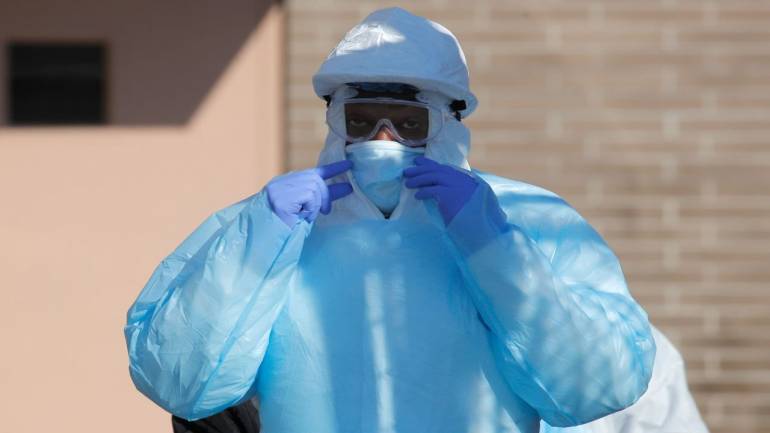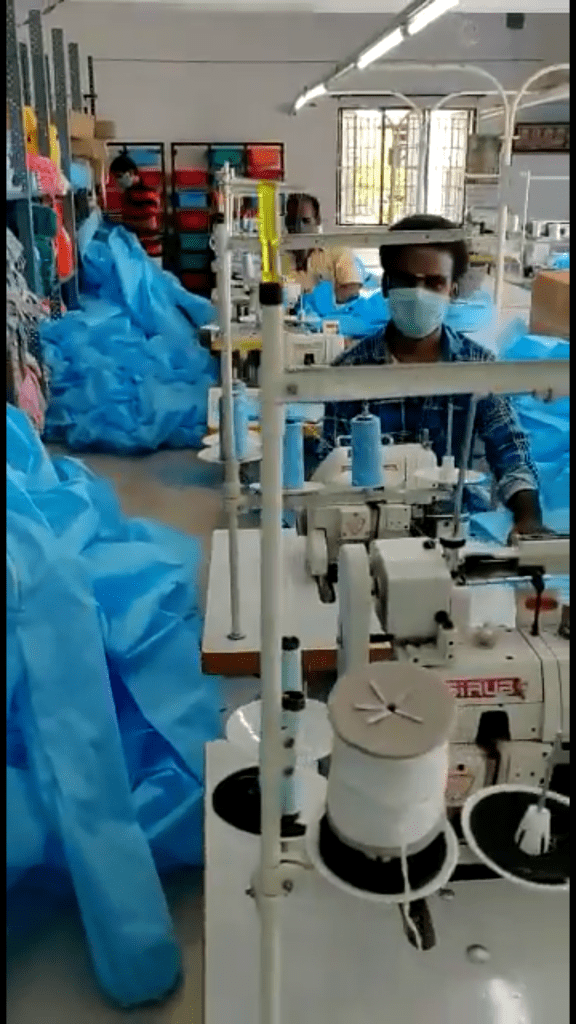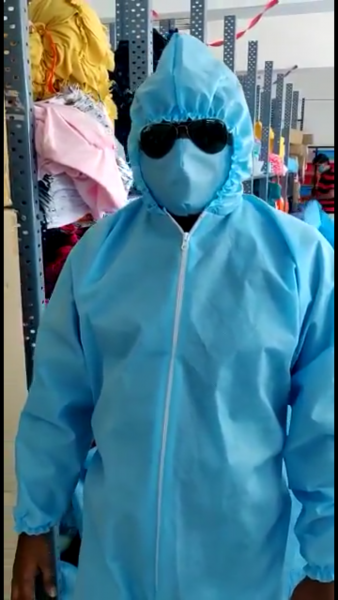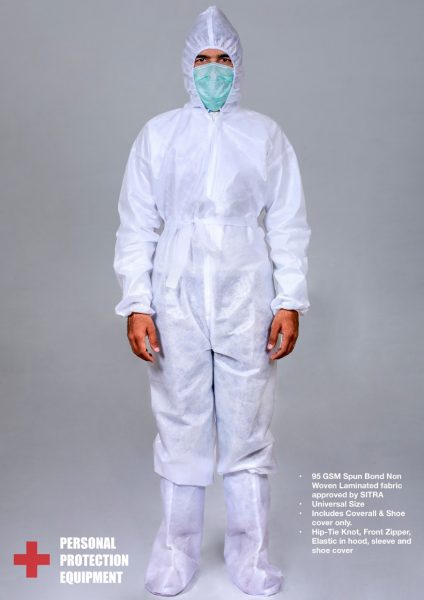
90% PPE samples fail SITRA test, but states far from quality checks
Amid misinformation related to the coronavirus pandemic spreading like wildfire on social media, a video that went viral alarmed many healthcare professionals.

Amid misinformation related to the coronavirus pandemic spreading like wildfire on social media, a video that went viral alarmed many healthcare professionals.
The video of a local garment factory in Tamil Nadu’s textile city Tiruppur offering to sell Personal Protective Equipment (PPE) for ₹198 took social media by storm.
The PPE shown in the video did not carry any certification mark, and the mask was also not a prescribed three ply mask. But the biggest problem of it all was the dark shades used for eye protection instead of the required transparent goggles, making healthcare workers to call it a mockery of the recommended hazmat suits.
This video sums up the PPE problem in India over the last one month.
India’s PPE problem
Several manufacturers out to make quick money cashed in on the ambiguity around specifications and started to sell substandard PPE suits.

“Initially there was a lot of uncertainty in what was expected in a PPE. There were a lot of solutions available from well meaning people as well as fly by night operators, costs were also not standardized. Over the last 2-3 weeks, the government has moved to make the cost and quality mandatory,” said Dr Sonal Asthana, a Bengaluru-based organ transplant surgeon who ran a campaign on Twitter to arrange PPE suits for government and charitable hospitals.
In fact, the country did not have any specification for PPE standard or a process to certify them. Most of the PPE suits were imported from China earlier. After the pandemic struck India, the country adopted the World Health Organisation’s specification for PPE suits.
An updated guidelines issued by the Ministry of Health and Family welfare on April 4, gives more specifications for PPE kit components.
“Gloves, face mask, head shield, cover all suit /jump suit – earlier spec was minimum 60GSM and now it is revised to 95GSM- splash proof / non permeable quality CE STD.02091, goggles and knee length shoe cover,” stated the circular.
SITRA certification
Fearing the manufacturing and sale of substandard PPE kits which protects the healthcare workers from catching coronavirus, the South India Textile Research Association (SITRA) lab in Coimbatore has started testing the raw fabric as well as sample PPE suits and certifying them.
The tests conducted revealed that 80-90 % of the samples failed the synthetic blood penetration test. In fact, as the demand for PPE suits increased, more and more players got into the business. But most of these samples sent for testing have failed.
Related news: UP hospitals allege state agencies supplying ‘substandard’ PPE kits
“In the first few weeks, we would get samples only from a few big manufacturers and the failure rate was only 50/50. But now so many people have got into manufacturing because the prices set by the Government are generous and its lucrative business. People with no idea, who were manufacturing sports and coat covers etc are now into PPE production. Our testing is stringent, we test the fabric and the seams for needle hole defect or possible viral penetration,” said Dr Prakash Vasudevan, Director, SITRA.
Earlier, this was the only lab which was testing and certifying PPE suits in the initial weeks of the pandemic. However, in the past 15 days, the government has authorized eight more labs to test PPE suits.
But worryingly, no state government has sent any PPE samples for random testing despite them procuring thousands of PPE suits from private players.
Substandard kits
Karnataka has already faced issues with the quality of PPE kits. The state government had placed an order with plastic surge industries for 3,50,000 PPE kits. But several complaints from health workers and failure of the company to rectify the quality issues forced the state to act.

Screengrab of a video which went viral, claiming to be selling PPE suits at Rs 198 in TiruppurOrders for 1,25,000 kits were withdrawn and unused substandard kits were returned to the manufacturer. Out of 11,05,000 kits the Karnataka government ordered, only 5,00,000 kits are being procured from government owned HLL Life Care Ltd the rest is being procured from 5 private manufacturers. Yet, the state hasn’t sent these samples for testing.
“This would be a major problem if left unchecked. State governments have purchased independently, they haven’t been tested. So far we haven’t received any samples from the state governments, which means they haven’t been tested. Substandard PPE suits will exist as long as the state governments and hospitals don’t test. When they buy in bulk they should send a few to be tested. It is a serious issue and we can’t play with the lives of doctors,” said Dr Prakash Vasudevan.
Some substandard manufacturers have now started producing fake SITRA certification. With three such cases coming to light, the testing body is now appealing people to check its website for details of certified manufacturers.
Apart from the government, companies, and individuals donating PPE suits to hospitals have fallen prey to this problem. In fact Victoria Hospital, Karnataka’s main COVID-19 hospital said it has sent back more than 12 consignments donated because they were substandard.
Related news: MP manufacturing 12,000 PPE kits every day: Official
A huge consignment by a city-based IT company was not up to the mark. Now the hospital is using those PPE suits in areas where there is no direct exposure to COVID-19 cases.
“What we do now is, we have two – three vendors whose quality we are happy with, so we ask donors to purchase from them and give it to us. Because in some cases it looks good but when doctors are wearing it, it tears off in places, because it’s not sealed properly. The quality of the fabric and stitching is very important, that should not happen when you enter the ICU. Some people are giving small spectacles instead of goggles, that is not useful,” said Dr CR Jayanthi, Dean of Bangalore Medical College and Research Institute.
No testing
The Rajiv Gandhi Institute of Chest diseases in the city now appealed to donors to get a few sample PPE suits checked by the hospital before ordering the entire consignment.

“We had dealers offering PPE suits for ₹150 and ready to supply 25,000 PPE kits, but backed out when we started asking for certification,” said a Delhi based journalist, who is running a fundraiser campaign to donate PPE suits to government hospitals.
Several vendors in market areas like Sadar Bazaar and Chandni Chowk have jumped into this business.
“The raw material is the same as the ones used to make carry bags and coat covers, so many people have started manufacturing this to make money while there is demand. But after SITRA certification was strictly implemented over the last week, many dealers of these sub standard PPE kits are stuck with their stock,” said Ankit Jain, a SITRA certified PPE manufacturer.
A government empowered committee said the country now has 107 domestic PPE manufacturers producing 1.8 lakh PPE kits per day and will cross the 2 lakh-mark soon.


